Geof Huth's Blog, page 28
May 21, 2011
Dragging a Child's Life Home
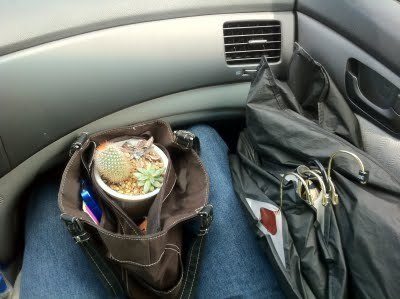
I do have a serious poetry-related blog posting to do, but I'll save that for tomorrow. Today, I'll note that Nancy and I dragged home all of Tim's leftover junk, which included winter clothes, multiple pillows, a sizeable set of plates, a good collection of strange liquors, and plenty of Ramen. It appears that our son was a college student.
And he didn't estimate the amount of stuff he had very well, though (once again), I was able to pack everything into the car, though very tightly, and only after an hour's work. I can pack a car very tightly, making use of every cranny it has, but it's hard work, especially on a hot and sunny day when I had to walk back and forth beside a car parked to completely block the sidewalk, and owned by a woman who could not see the need to move even after many complaints from multiple people. An annoying day.
In my lap above is Nancy's purse with a pot of succulents in it. And note the garment bags beside me. That might look like tight packing, but usually the passenger has to hold a huge pile on a lap after packing up Tim.
The photo below gives some sense of how tight the packing job was. It was a long three-hour trip, the car is unpacked, and we've reboxed much of the stuff. Tim is in Sag Harbor now, already working at his first post-college job. Not much of a summer vacation, and he hasn't had one for the past three years either. He flew the nest when he went to college, so it's not a new experience to lose him.
No more posts about Tim for a while. He is on his own now.
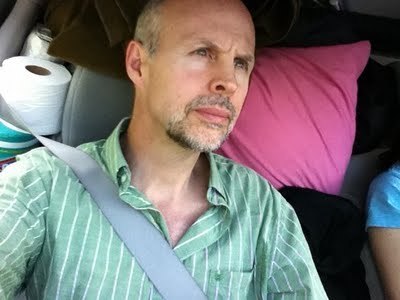
ecr. l'inf.
Published on May 21, 2011 19:29
May 20, 2011
A Son Graduated in the Manner of the Layers of Colors in the Sunset
Hilton Garden Inn, Room 302, Rye Brook, New York
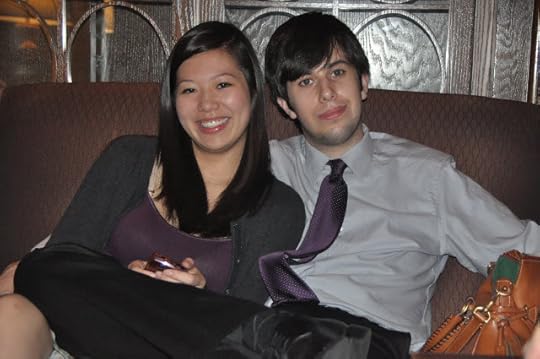 Jacqueline Leung and Tim Huth, Rye Brook, New York (20 May 2011)
Jacqueline Leung and Tim Huth, Rye Brook, New York (20 May 2011)
I am still 50 years of age (until five days from today), and all of my children have graduated from college. I think of myself as young, and believe that people think I'm old, and I'm so far ahead of where most people are of my age (in terms of the age of my children) that it seems like a life has ended as a life begins.
My children have been a blessing. I doubt that very many parents have ever had children who were so little trouble, who did so well with so little apparent effort from their parents, and who caused so little trouble. When talking to my son's girlfriend Jackie Leung (who is a wonderful person herself: talented, smart, funny, kind, pretty), about my son Tim, who graduated today from Purchase College, I told her that the only problem I could think of with Tim was that he played World of Warcraft too much for one semester in high school, which led us to restrict his computer use and which I believe he wasn't in the top ten of students in his large graduating class. He was twelfth. In a class of almost 600 (much better than I had done).
He is a good man. A hard worker. Intelligent. Focused. Dependable. And even kind, even when he thinks he may be smarter than the people he is working with--and that is a balancing act. He graduated today cum laude (and there were very few people graduating with honors) with a BFA in theater design technology, but his concentration and his field is lighting design.
The world of lighting design is strange, as is the world of television producing (where my daughter Erin works), so most of the jobs he will have, at least for the short term, will be short-term jobs. Still, even though not too many of his classmates have jobs, our son has more jobs than he can accept, though the longest lasts only a couple of months. He starts work tomorrow, out at the end of Long Island, in Sag Harbor. Then he'll probably take a very short-term job in between before he spends two months at a theater at Vassar College in Poughkeepsie, New York.
I don't understand lighting design, but I can tell that my child knows what he is doing, and lighting design seems like the work for him. Nancy and I have attended all of these plays that Tim has ever worked on at his schools, and one that he worked on over the summer as an intern. After the one play he had designed the lighting for, I noted one part of the lighting that I particularly liked, but I added that I didn't really notice much of the lighting or know how to evaluate it. He said that was fine, that usually lighting succeeded if you did not notice it.
He is a person who understands his abilities but is not overtaken by ego. He is happy to work in the shadows yet create the light that shines on others and makes others look better, work better. It is rare to find a man as good as my son, and I believe I can take some credit for creating a person better than I will ever be, but I know this was a joint effort with my wife Nancy. Despite all of our faults, we were created with one skill that we both shared (well, besides a capacity for language): we were born to be parents. Or we learned to be parents because we were both eldest children. I don't understand what is difficult about parenting. It has been one of the few things in my life that I have done well.
I like to say, and so I say it all the time, that I have only two skills: talking and typing. But I need to add parenting to it, because I've made great children, though only with Nancy's leavening. I am lucky to have the children I have: smart, dedicated, skilled, fun, and even good-looking.
Tonight, we give the last (and only the second) of our children over to the world. We ask the world to take care of them, and to take particular care of our last child to enter that bitter cold of adulthood.
And to Tim we ask him to be exactly who he is, because he is perfect just so.
Good luck to all our children: To our daughter Erin, who works skillfully in the heartless world of television. To our son-in-law Jimmy, who is an extremely talented video editor, whose work in commercials you have probably seen (because I have, and I watch almost no TV). To our son Tim, who will immediately join his profession the day after graduating from college. To his girlfriend Jackie, who has a year of school to finish, but whose skills in scenic design continue to amaze us.
They are all in entertainment in some way, but you will almost never see them on a stage or a screen, though they will make those stages and screens better for you.
ecr. l'inf.
 Jacqueline Leung and Tim Huth, Rye Brook, New York (20 May 2011)
Jacqueline Leung and Tim Huth, Rye Brook, New York (20 May 2011)I am still 50 years of age (until five days from today), and all of my children have graduated from college. I think of myself as young, and believe that people think I'm old, and I'm so far ahead of where most people are of my age (in terms of the age of my children) that it seems like a life has ended as a life begins.
My children have been a blessing. I doubt that very many parents have ever had children who were so little trouble, who did so well with so little apparent effort from their parents, and who caused so little trouble. When talking to my son's girlfriend Jackie Leung (who is a wonderful person herself: talented, smart, funny, kind, pretty), about my son Tim, who graduated today from Purchase College, I told her that the only problem I could think of with Tim was that he played World of Warcraft too much for one semester in high school, which led us to restrict his computer use and which I believe he wasn't in the top ten of students in his large graduating class. He was twelfth. In a class of almost 600 (much better than I had done).
He is a good man. A hard worker. Intelligent. Focused. Dependable. And even kind, even when he thinks he may be smarter than the people he is working with--and that is a balancing act. He graduated today cum laude (and there were very few people graduating with honors) with a BFA in theater design technology, but his concentration and his field is lighting design.
The world of lighting design is strange, as is the world of television producing (where my daughter Erin works), so most of the jobs he will have, at least for the short term, will be short-term jobs. Still, even though not too many of his classmates have jobs, our son has more jobs than he can accept, though the longest lasts only a couple of months. He starts work tomorrow, out at the end of Long Island, in Sag Harbor. Then he'll probably take a very short-term job in between before he spends two months at a theater at Vassar College in Poughkeepsie, New York.
I don't understand lighting design, but I can tell that my child knows what he is doing, and lighting design seems like the work for him. Nancy and I have attended all of these plays that Tim has ever worked on at his schools, and one that he worked on over the summer as an intern. After the one play he had designed the lighting for, I noted one part of the lighting that I particularly liked, but I added that I didn't really notice much of the lighting or know how to evaluate it. He said that was fine, that usually lighting succeeded if you did not notice it.
He is a person who understands his abilities but is not overtaken by ego. He is happy to work in the shadows yet create the light that shines on others and makes others look better, work better. It is rare to find a man as good as my son, and I believe I can take some credit for creating a person better than I will ever be, but I know this was a joint effort with my wife Nancy. Despite all of our faults, we were created with one skill that we both shared (well, besides a capacity for language): we were born to be parents. Or we learned to be parents because we were both eldest children. I don't understand what is difficult about parenting. It has been one of the few things in my life that I have done well.
I like to say, and so I say it all the time, that I have only two skills: talking and typing. But I need to add parenting to it, because I've made great children, though only with Nancy's leavening. I am lucky to have the children I have: smart, dedicated, skilled, fun, and even good-looking.
Tonight, we give the last (and only the second) of our children over to the world. We ask the world to take care of them, and to take particular care of our last child to enter that bitter cold of adulthood.
And to Tim we ask him to be exactly who he is, because he is perfect just so.
Good luck to all our children: To our daughter Erin, who works skillfully in the heartless world of television. To our son-in-law Jimmy, who is an extremely talented video editor, whose work in commercials you have probably seen (because I have, and I watch almost no TV). To our son Tim, who will immediately join his profession the day after graduating from college. To his girlfriend Jackie, who has a year of school to finish, but whose skills in scenic design continue to amaze us.
They are all in entertainment in some way, but you will almost never see them on a stage or a screen, though they will make those stages and screens better for you.
ecr. l'inf.
Published on May 20, 2011 20:59
May 19, 2011
Everyday Evason Every Day
Hilton Garden Inn, Room 302, Rye Brook, New York
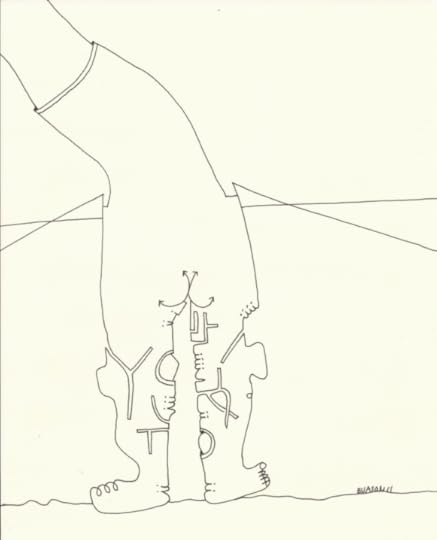 Greg Evason, "Untitled 17" (2011)
Greg Evason, "Untitled 17" (2011)
Every day, or nearly so, Greg Evason sends me and an unknown number of correspondents his poems, drawings, and paintings. It is his emailart.
The poems he sends are much different from his poems from the late 1980s and early 1980s. They have a naive character that he grew into, which is the opposite of what one would expect, but they have a reverberating power. They are often simple stories of real life that swerve into surrealism, violence, horror, and almost everything else, making my email a set of unexpectable surprises.
His paintings and collages are made quickly, but they have a controlled purposefulness. They almost always capture my attention, especially in the way that he uses everything for them, especially packaging of goods he's purchased.
But tonight I want to think about his drawings, which I find exquisitely beautiful. His control of the line is so deft that I year for that control myself (and I have some control, but not like his). I want the eye he has, the hand he has to move so deftly, so apparently effortlessly, through the making of these spare but lively and ultimately beautiful pieces, which also lean surrealistic.
His untitled piece above gives some sense of work he does, and I chose it because of its vispoetic character. The lower half of a man appears to transform into an arm extending out of a sleeve and then out of a sleeve, handless, and maybe the arm turns into a head. But into the legs of this man are cut letters of the alphabet that almost spell out words, that suggest the naming of the man, that give a sense of us as people of signs and meanings.
And meanings are much different than meaning.
ecr. l'inf.
 Greg Evason, "Untitled 17" (2011)
Greg Evason, "Untitled 17" (2011)Every day, or nearly so, Greg Evason sends me and an unknown number of correspondents his poems, drawings, and paintings. It is his emailart.
The poems he sends are much different from his poems from the late 1980s and early 1980s. They have a naive character that he grew into, which is the opposite of what one would expect, but they have a reverberating power. They are often simple stories of real life that swerve into surrealism, violence, horror, and almost everything else, making my email a set of unexpectable surprises.
His paintings and collages are made quickly, but they have a controlled purposefulness. They almost always capture my attention, especially in the way that he uses everything for them, especially packaging of goods he's purchased.
But tonight I want to think about his drawings, which I find exquisitely beautiful. His control of the line is so deft that I year for that control myself (and I have some control, but not like his). I want the eye he has, the hand he has to move so deftly, so apparently effortlessly, through the making of these spare but lively and ultimately beautiful pieces, which also lean surrealistic.
His untitled piece above gives some sense of work he does, and I chose it because of its vispoetic character. The lower half of a man appears to transform into an arm extending out of a sleeve and then out of a sleeve, handless, and maybe the arm turns into a head. But into the legs of this man are cut letters of the alphabet that almost spell out words, that suggest the naming of the man, that give a sense of us as people of signs and meanings.
And meanings are much different than meaning.
ecr. l'inf.
Published on May 19, 2011 20:59
May 17, 2011
Nothere Again
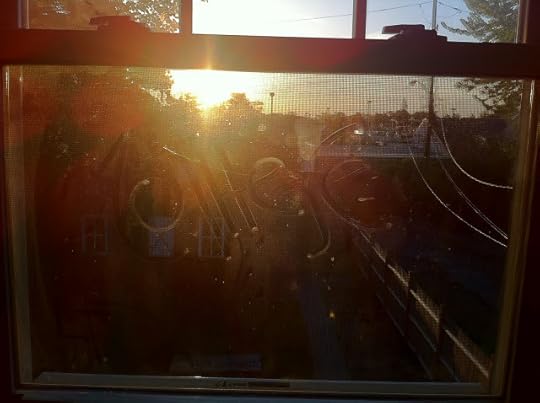 Geof Huth, "Nothere" (refound on 13 May 2011)
Geof Huth, "Nothere" (refound on 13 May 2011)We are haunted. And every ghost is of our own creation. The past rises up to greet us when we expect something new. We cannot escape it. The things we did we do again, over and over, and we wonder why we cannot become better people, or become better at it. And "it" changes with the day. We recirculate everything. Every one of us has only a certain number of stories to tell, so we tell them over and over. The details might change, but our situation (trapped with just these meager scraps of the past) does not. I can tell you, again, the story of being in the mountains around Calacoto, Bolivia, and lowering all five of my siblings into a cave I did not know the exit to. It is a good story, even with so many details lost, but it is just one story, not more evidence of my life. It comes back to me because it tells me about myself. I take risks with others. I take risks with myself. I lowered myself into the cave last and pulled the rope down with me afterwards. My mother banned us from the mountains after that, especially me, but I could not stay out of them. I could have slipped off a little skirt of the mountains and fallen hundreds of feet to my crippled death dozens of times, but I never did. While blind caving (meaning without flashlights), I could have crawled my way off a ledge to my death, but the light always came just in time and I could see the danger. These stories return. I tell them in a certain order. I remember rolling boulders off a cliff in Bolivia so that they would bounce, maybe ten feet high, off the ground a hundred feet below. I was of the mountains. It never leaves me. Nothing does. Cut off an arm, and we still have a memory of that arm, we still feel that arm, and even dream of it. This morning, just before waking, I went through a dream carrying a small girl, and she said something about my baldness, and I said she had plenty of hair, plenty of brunette hair like that of my daughter Erin, age 26, because that toddler was my daughter. I was remembering the talkative, intelligent, beautiful girl she was. And she hasn't changed. So, when I found a poem of mine, a temporary poem, four days ago, on the window of my bathroom, I recalled that nothing never leaves us. Even memories long forgotten sometimes returne. There are events in my life that I willed out of my memory for decades, only to be shocked by their return, to be shocked by my life. So this poem, a little pun (the highest form of literature), is a poem about being in place but not being in place, a poem about the instability of our desires and actions and bodies in motion through porous space. It is such an obvious poem: "Nothere." Meaning both "not here" and "no there," meaning, in the end, "nowhere," because there is nowhere to be. Except maybe everywhere. This poem on 13 May 2011 is a remnant of a steamglyph, a poem written into the steam of a certain window of our bathroom, the window that looks west towards my place of birth, thousands of miles away. I wrote the poem at the spur of the moment, because I had found a writing surface thick with condensation. I wrote the poem on the window, so I wrote it to overlay the old carriage house in the backyard, our three-car garage, what I sometimes call the back house, a building made of bluestone on all four sides, something of a leaky wonder, a place where I once lived, a part of our house, an extension of our lives as members of a family, a wordy, often noisy, obstreperous family. And after I wrote the poem, with my finger in the steam, I took a photograph, and then the poem disappeared, for months. I'd forgotten about it, just as I've forgotten the fact and fashion of so many poems I've written into the sand, the dirt, frost gathered on windows, steam on same, the snow. I write in these surfaces to make a poem of the moment that might last only a moment (especially with sandglyphs). These poems are meant to fade, to sink, to disappear back into the earth, into the recesses of memory. Some of them only I, of everyone who has ever lived, has ever seen them in fact rather than photograph. So for one to rise from the dead is a shock of sorts, small, but sudden, and sharp. I can see in its outlines the trace of my fingerprints, the evidence of dirt, the word as smudge. And I see a sense of continuity, how a thing extends into the future not because it exists, but because it is remembered. I write this while sipping Clear Creek pear brandy, which is vaguely sweet but intense, which carries with it the taste of a pear so ripe that a bite into it would release the sweet and liquid juice of that pear down over one's chin. This brandy, not quite an eau de vie, but almost that methodical water of life, is a memory, not of a pear, but of scores of pears, those pears that grew into a vibrant ripeness in Oregon, birthplace of my great-grandmother (she in the Willamette Valley). Memory has something to do with more of me. Nothing can be repeated in full, but everything is reflected, reflected upon, a refraction of the light of recognition. While sipping an armagnac earlier in the evening, I was struck by its vanilla butteriness and by the thought that, somehow, grapes had transformed themselves into this sweet and strong brown liquor with a depth and variance of flavor so much greater than wine. We remember even what we've forgotten. It is like muscle memory. We teach the mindless parts of our body to remember for us. That is how I taught myself to ski in my thirties. Muscle memory. It comes back. We remember. And muscle is just the memory of a mouse, a mus, because the word "muscle" is just a Roman (so Latin) metaphor: the muscle rippling resembling the surging (and muscular) running of a mouse. Every muscle is a mouse running away, is a memory of that running. We cannot escape the past because it adheres to us. And when I look at this photograph of a memory of a poem I wrote in an instant (for I am a creator of things in place, a creator of the, in the, moment), I think of a poem of Nancy's that haunts me, maybe because I know what it means, but I really do not. I have tried to remember, or tried to figure it out, or tried to assume it was a reference to something real, but I don't know, and I haven't asked. Nancy is a better poet than I (not more prolific, just better), and she is more careful with words, but her poems often have strange canted references to the past, to her reality, and I try to figure them out, always without asking her. Because there are some things we do not want to know, no matter how hard we struggle to learn them, to interpret them, to define them into place so that they cannot squirm away. It is a strange sensation, one of a memory I might not ever have had trying to regain its footing in my head, something to do with these lines:
What if you wokeThat is where I write, how I write, anywhere, any where, no or not where, but what could I have written? Nothing? Something? A poem? I write poems in the mirror. Or on it. And pomes in the steam of the glass of a window. Even poems on my palms. Every psalm is of the palms, especially on Sunday. But how does a memory of something I don't know haunt me? I want to understand a poem on my own terms, without the aid of answers from an outside source. I want to think myself an encapsulated instance of humanity, separated from all others, unique, given to expressions not interpretable outside of myself, yet I want all texts to be meaningful to me. We make sense out of the world, or we fail to make that sense. We have memories we will never use again, but we carry them within them as solid as a liver processing pear brandy. I think, sometimes, of that tall American persimmon that I found in my neighborhood in Goodlettsville, Tennessee, in the late 1970s. Its fruits were tiny compared to the Asian persimmon we could find at the market, and these were overpopulated with seeds, maybe five of them. I can't remember. Memories are as slippery as the eels I caught when I lived on the beach of the Caribbean in Barbados and could hold onto them only because I wore gloves. Those tiny American persimmons were still sweet, once they had ripened to an almost syrupy softness, and they made great food for opossums, but no-one ate them, except for me. I gathered scores of them (I could probably hold seven in the palm of my left hand), and I ate them because I knew I could, because they were a wild food, an American food, someone no-one normally ate, because otherwise that would rot orangely back into the earth, having served no real purpose, though maybe a new tree or two came out of this profusion of orange fruits. I am reminded of Tristram Shandy and his story, which is not the story itself, which is lost early enough, but which is the story of digressions, because there is never a single point, there is never a muscular river riding its way down to the open ocean, there are only tributaries off that river, and we follow them all as we think. It is late now, too late. I'd meant to get to bed early, but it's too early in the morning for that, so I'll go too sleep now. You see, I am of the west. Which means I am of sunset, and it is time to set. I'll leave open as many poems, as many words, as I can for you to read. Maybe some day you will remember one of them.
one morning
to step out of the shower
glimpsing your wet
nakedness
stepping over the tub
out of the shower
and saw on the mirror
a series of thumb
prints thumb and fingertip
dots even dashes with frayed
edges written not in soap
but in the steam a clear
message since you could see
ecr. l'inf.
Published on May 17, 2011 21:55
May 16, 2011
I Am Blessed by the Beauty of Others
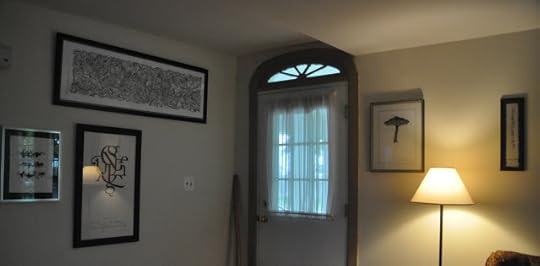
Yesterday, Nancy and I hung quite a few framed pieces of visual poetry up around the house. We had collected these works over the course of five or six years, and we had them framed almost all at once over the course of three months. The people at the art supplies store and framing shop we go to came to know me by name, and they liked the work we brought in (which also included a double lifesize portrait painting of me by Didi Menendez). My photographs do not capture the beauty of these pieces, but they fill me with hope, because I am a romantic.
The piece at the top left is derek beaulieu's monumental "Prose of the Trans-Canada," which really should be hung vertically, but my curatorial decision was to hang it horizontally, just as derek made it, upon his coffeetable, which was just a little shorter than this visual poem was long. The large piece beneath derek's is "Parts of a Character" by Susanne Cerha. It is meant to be a typographic design made out of all the pieces a of the letters of the Latin alphabet, but it is a remarkably vibrant visual poem. And beside that is "geof's birthday haiku on 25 V 10" (for my fiftieth birthday last year), one of Scott Helmes' many exquisite and post-textual visual poems.
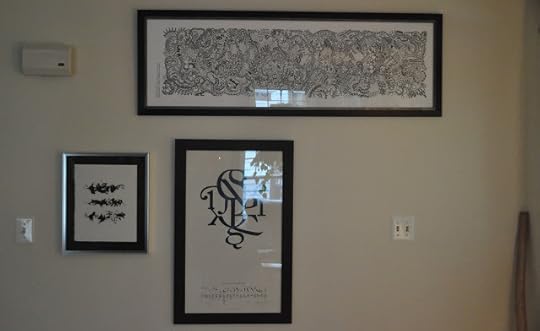
The detail helps a little, but the reflection in a static photograph is more disturbing here than in real (in motion) life, where it is unperceived, because we step around it.
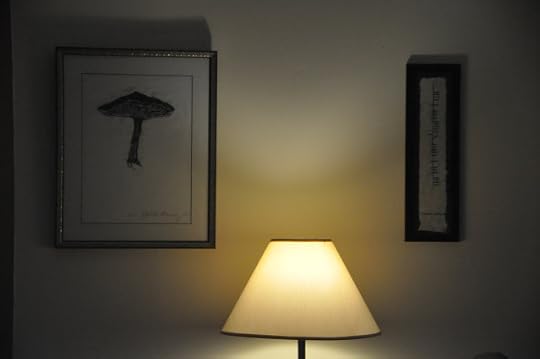
A small number of the pieces we hung were not visual poems, such as this mushroom printed by Desiree Alvarez on chiffon, which is paired with a little text in Ogham. Not all of the textual pieces I put on my walls are visual poems, but most of the pieces are textual.
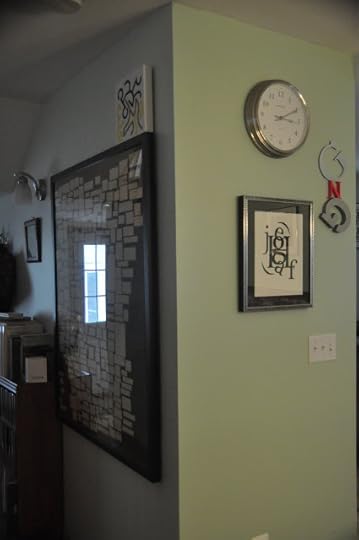
Between the hallway leading to the backyard and the dining room, I can see my huge framed copy of Robert Grenier's "CAMBRIDGE, M'ASS" along with a smaller silkscreen print made by Francis van Maele of a visual poem of mine. Note, also, that a painting of mine rests atop Grenier.
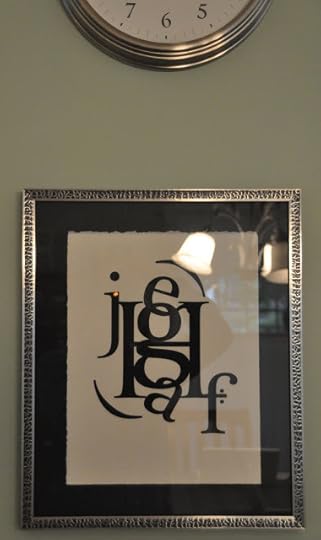
A closeup of my print with the clock it rests beneath shows its careful, oh, maybe, too careful, detail.
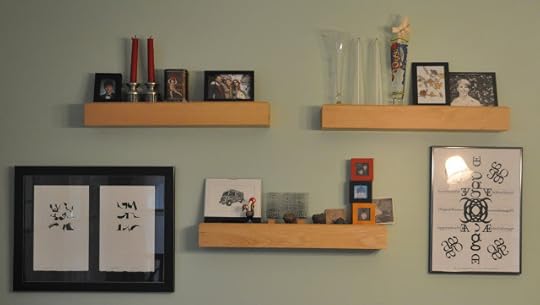
Deeper into the diningroom, there is a pair of Scott Helmes' typographic pieces ("Haiku # 49" and "Haiku # 81") framed together and mirroring my poem, "THEspaestfbetwee" (which I realize must be lowered a couple of inches).
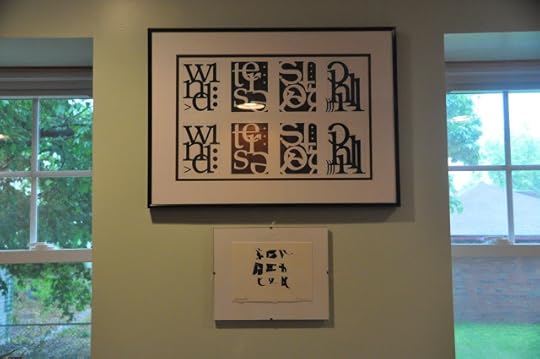
Even in the kitchen, I have visual poetry looking at me: my visual poem "wind:" and another Helmes piece, "Haiku # 53." Lots of Helmes, but I could never have enough, not of this beauty. I am surrounded by beauty, the beauty of text, but there can never be enough.
ecr. l'inf.
Published on May 16, 2011 20:46
May 14, 2011
Some Days are Days for Singing
This past Thursday, May 12th, I created little extemporaneous sound poems over and over again over the course of the day. Starting in the morning, I created both an audiopoem and a videopoem at work, and then I created two more of each when I had returned to my house. There is nothing unusual in all of this, but somehow I see the singing and soundmaking as a kind of purging after three weeks of travel ending right at the beginning of what is always the busiest week of my work year. (One of these pieces, the one I made from my bed itself, is listed as being created on the 13th, but that's only because the service I used for that, Audioboo, tags everything as Greenwich Mean Time.) I've been listening to these over the last couple of days, so they entertain me and seem reasonably distinct from each other.
Listen!
Geof Huth, Making Triangles from What I See Song (12 March 2011)
Geof Huth, Finding Red in Green Song (12 March 2011)
Geof Huth, Weeding Maples Song (12 March 2011)
Listen!
Listen!
ecr. l'inf.
Listen!
Geof Huth, Making Triangles from What I See Song (12 March 2011)
Geof Huth, Finding Red in Green Song (12 March 2011)
Geof Huth, Weeding Maples Song (12 March 2011)
Listen!
Listen!
ecr. l'inf.
Published on May 14, 2011 20:27
May 8, 2011
The Numeral 3 on a Dumpster
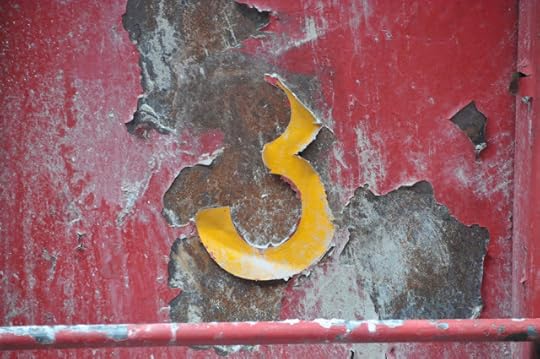
Since April 20th, I've been traveling almost every day, flying first to Montana, returning to Schenectady for a couple of days, flying to England, returning for a day, driving to Virginia, driving back after a few days but only to New York City, and finally driving home tonight.
I am behind on plenty of work now. Work work. Yard work. Professional association work. Even some poetry work, though I somehow managed to write a poem in the form of a letter every day. I'll spend at least this week catching up, and this is the busiest week of my work year, the week of our grants review. Everything gets done only just in time, if that, in such a life.
During my travels, I saw many of my far-flung friends, attended two professional associations, gave two full-day workshops, one talk, and one performance, took nine plane flights, visited eight states, attended the Text Festival, and saw, just tonight, an exhibition of Stephen Vincent's art in Tribeca. I keep telling myself that I have to stop doing too much just to keep in touch with the poetry world, but I still decided to attend Stephen's show, knowing it would mean I'd return home no earlier than an hour before midnight. I've cut back some, but not enough.
While I was in Manhattan today, I spent most of my time taking pictures, particularly pictures of text (such as the 3 above), and I'll start revealing these over the next few days, just as I'll continue writing about the events I've witnessed over the last three weeks of travel. Tiring weeks but enjoyable and valuable.
Now it is time for sleeping, and I am not even dead.
ecr. l'inf.
Published on May 08, 2011 20:39
May 7, 2011
Ten New Pwoermds
Astoria, New York
I've been traveling for three weeks almost straight, and I'll still be traveling tomorrow, with many late nights, sometimes exceedingly late, so I'm tired enough to suspend my review of the Text Festival for a night and present, instead, a few of the pwoermds I created today:
*
+×+×+×+×+×+×+
*
inslight
*
insleight
*
flexical
*
INFLOWENCE
*
mardbled
*
bledded
*
inuousnous
*
exinuousness
*
lambp
*
I wrote all of these, along with a couple of visual pwoermds during a session I spoke at today in Alexandria, Virginia (before the drive to Astoria). I allowed the words people used to inspire me. Just a few little words, the tiniest bits of creativity for the tiniest bursts of joy.
ecr. l'inf.
I've been traveling for three weeks almost straight, and I'll still be traveling tomorrow, with many late nights, sometimes exceedingly late, so I'm tired enough to suspend my review of the Text Festival for a night and present, instead, a few of the pwoermds I created today:
*
+×+×+×+×+×+×+
*
inslight
*
insleight
*
flexical
*
INFLOWENCE
*
mardbled
*
bledded
*
inuousnous
*
exinuousness
*
lambp
*
I wrote all of these, along with a couple of visual pwoermds during a session I spoke at today in Alexandria, Virginia (before the drive to Astoria). I allowed the words people used to inspire me. Just a few little words, the tiniest bits of creativity for the tiniest bursts of joy.
ecr. l'inf.
Published on May 07, 2011 20:37
May 6, 2011
The Release of the Alphabet into the Wild
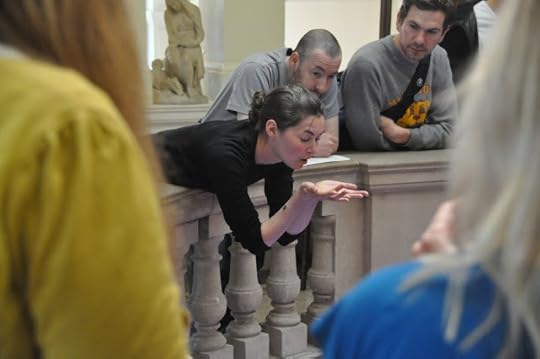 Sarah Sanders in Performance, Bury Art Gallery, Bury, England (30 April 2011)
Sarah Sanders in Performance, Bury Art Gallery, Bury, England (30 April 2011)(photo by NF Huth)
The simplest things can be the best.
During the opening of the Text Festival and its myriad art exhibitions in and near the Bury Art Gallery, in Bury, England, Sarah Sanders performed the simplest of acts at the oculus on the second floor of the building, and it was a performance that carried down onto the first floor.
She came to the railing around the oculus, where a number of people had gathered to watch her, and she held her two hands cupped together but open, and she gently blew the two handsful of paper letters out of her hands, slowly, so that they drifted onto the floor. Afterwards, she stood and smiled, and we clapped.
Hers was a beautiful release of the pieces of language into the world, to deal with the unavoidable aspects of the world: gravity, for instance. Her many was graceful and quiet. She arrived, she blew, she was done, but that was quite enough.
I caught this performance, though only clumsily, on video, but Nancy took a number of photographs that captured the real beauty of this act.
Sarah Sanders in Performance, Bury Art Gallery, Bury, England (30 April 2011)
ecr. l'inf.
Published on May 06, 2011 20:59
May 4, 2011
A Glass Case Filled with Objects and Words
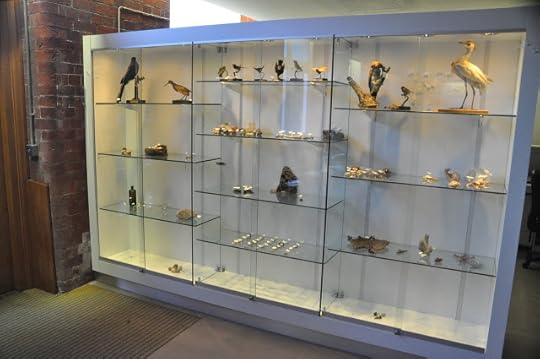 Helen White's Installation, Bury Art Gallery, Bury England
Helen White's Installation, Bury Art Gallery, Bury EnglandOne of the most beautiful pieces at the exhibits for the Text Festival in Bury, England, was Helen White's installation. Upon the many glass shelves of a large vitrine on the lowest floor of the art gallery, she had placed constellations of (primarily natural) artifacts from the museum's own collection, and then she pinned little labels in place on or beside these objects.
What is amazing about this temporary art piece is how beautifully she arranged these small obsessively collected objects and then how beautiful were the labels she attached to them. The labels were never obvious (a shell was never called "shell"). Instead, the words she chose defined the words aslant and poetically, creating a esthetic experience I thought probably the most supreme of the entire show.
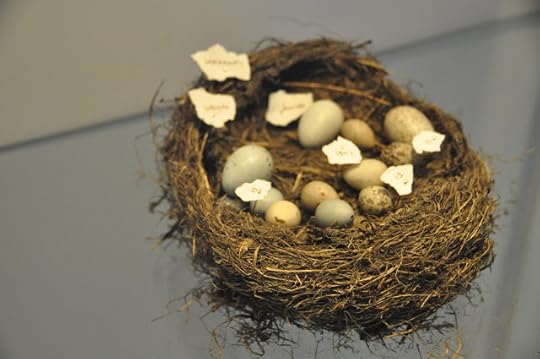
Sometimes the pictures I took did not focus on the words themselves, as in the case of this picture, focused on the forward-jutting lip of this bird's nest. This collecting mania I mentioned is clear in this object. Birds' nests don't change much over time, so the saving of one is an interesting action of keeping the world from disappearing, and this one is filled with eggs of different birds, making it a kind of United Nations of ornithology. I wonder exactly how Helen was set loose in the Bury Museum's collections to identify the objects she wanted to use and to label.
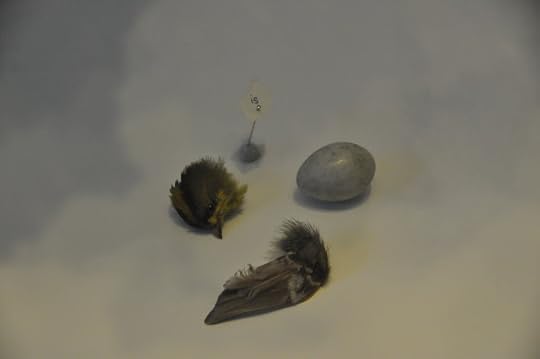
Related to the bird's nest is this spooky little triad: the head of a small, probably immature, bird, and its right wing (but no more of its body), and an egg that represents its beginning and its now-lost wholeness, and all of this tagged with the single word "is." For, even in this state of fragmentation, the bird still is.
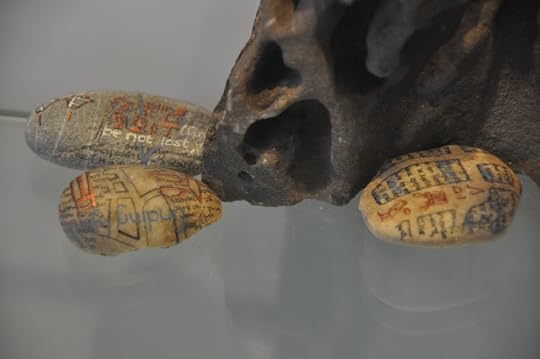
Only one of the constellations of objects does something with objects not from the Bury Museum's collection, and that is this one, which includes a rock that is joined by a trio of rocks painted and worded by Helen herself. These were hard to read, but they serve to be reminders of humankind, cultural objects noting the interests and intellects of humans in the cold and thoughtless natural world.
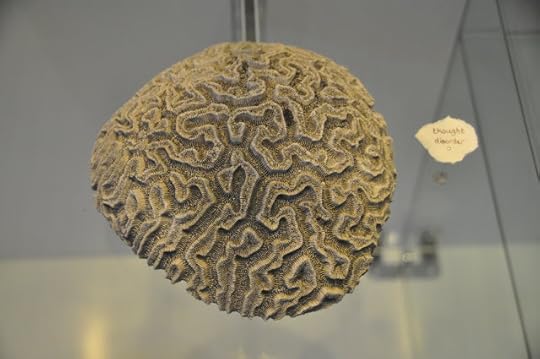
And it is clear that Helen knows what brain coral is when she calls it "thought disorder." Here is a faux brain, the remains of thousands of small animals left in the form of coral, but nothing that can think, nothing that could ever think. This is indeed a meaningful semiobject, one in which the object and the word for it vibrate with the warmth made when meaning and senselessness rub together.
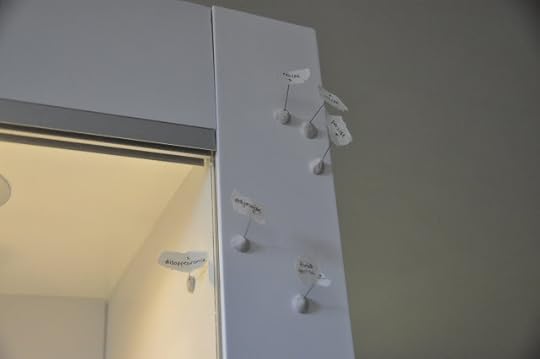
I almost missed it, but Helen also labeled a constellation of nothings outside the cabinet, giving its labels like "resist," "insist," and "persist" (the objects resist definition, the labels insist otherwise, but the connections between the two and the objects alone and themselves persist), and "disappearance" (because the labeled windowglass is not about being seen but being seen through, and because this large artwork will be dismantled after a few months).
And that is too bad. I could have spent an hour thinking about this piece. It is rich and beautiful and full of insight and humor (like the empty shelf labeled "Atlantis"), and it is about the visuals as well as the words. It is a great visual poem, radiating intelligence and meaningfulness even as it questions the possibility of unshakeable meaning. My thanks to Helen for letting us peek into her mind for a bit.
ecr. l'inf.
Published on May 04, 2011 20:42



